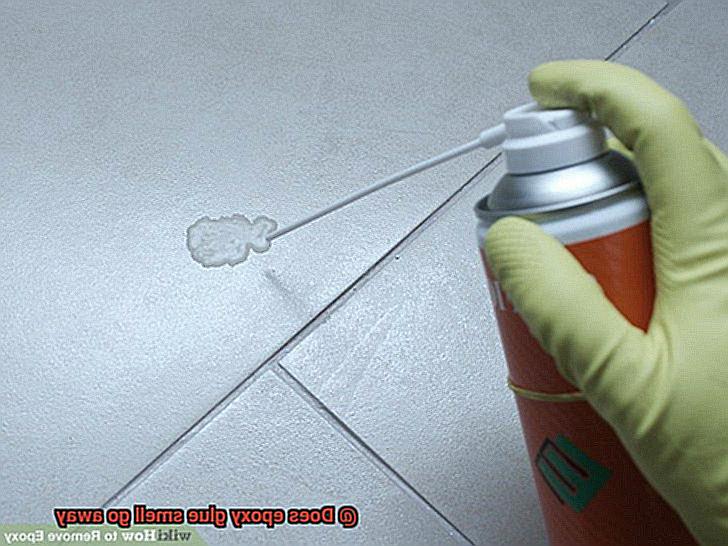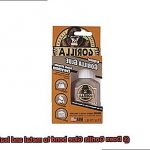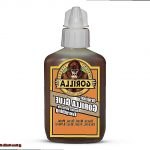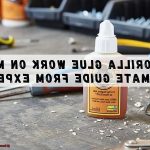Epoxy glue is a go-to option for those looking to bond materials together with a powerful adhesive. However, the lingering smell that accompanies it can be quite overpowering and unpleasant. So, what’s the deal? Does epoxy glue smell go away or are we stuck with it forever?
Well, as it turns out, there are a few factors at play when it comes to the duration of epoxy glue smells. Things like the type of epoxy used, the curing process, and ventilation all play a role in how long you’ll have to endure the stench.
For those working in enclosed spaces or with sensitivities to strong odors, this can be a major annoyance. But fear not. In this blog post, we’ll explore everything you need to know about getting rid of that pesky epoxy glue smell.
We’ll cover topics like how long you can expect the smell to last after application and different approaches you can take to mitigate its effects. Plus, we’ll even delve into whether or not leaving your epoxy glue to dry for longer can help eliminate or reduce its odor.
If you’re tired of living with that pesky epoxy glue smell in your workspace, keep reading. We’ve got all the tips and tricks you need to make it disappear.
What is Epoxy Glue?
Contents
Epoxy glue is a remarkable two-part adhesive that is highly sought after for its unparalleled strength and durability. This adhesive is made up of two components, a resin and a hardener, which are mixed together to create a chemical reaction that forms a bond that can withstand the test of time. With its remarkable bonding properties, it is no surprise that epoxy glue is widely used in various industries such as construction, woodworking, and electronics.
One of the most incredible things about epoxy glue is its versatility. It can bond different materials, including metal, wood, plastic, and glass. This adhesive also exhibits remarkable resistance to water, chemicals, and heat, making it ideal for use in harsh environments.
Epoxy glue comes in different formulations, including two-part and one-part systems. Two-part epoxy requires mixing the resin and hardener in equal parts before application, while the one-part system requires heat to activate the hardening process. The adhesive can also dry clear or have a slight yellow or amber color.
When working with epoxy glue, it is crucial to follow the manufacturer’s instructions carefully and to use protective gear such as gloves and goggles. The mixing and curing process of epoxy glue can emit fumes that are harmful if inhaled. Therefore, it is essential to use the adhesive in a well-ventilated area to minimize exposure to these fumes.
Despite its incredible bonding properties, one drawback of using epoxy glue is its pungent smell during application and curing process. However, this should not deter you from using this adhesive as the smell dissipates over time as the glue cures completely.
The amount of time it takes for the odor to go away varies depending on factors such as the type of epoxy glue used, the amount applied, and the environment where it was applied. In addition to proper ventilation during application and curing process, activated charcoal or baking soda can be placed in the area to absorb the odor. Cleaning the surface with warm soapy water and wiping it down with white vinegar is also an effective method of getting rid of the odor.
Causes of the Smell of Epoxy Glue
If you’re a fan of epoxy glue, you’re probably familiar with its pungent odor. While the smell can be overwhelming and unpleasant, it’s important to know that it’s caused by the chemicals present in the adhesive.
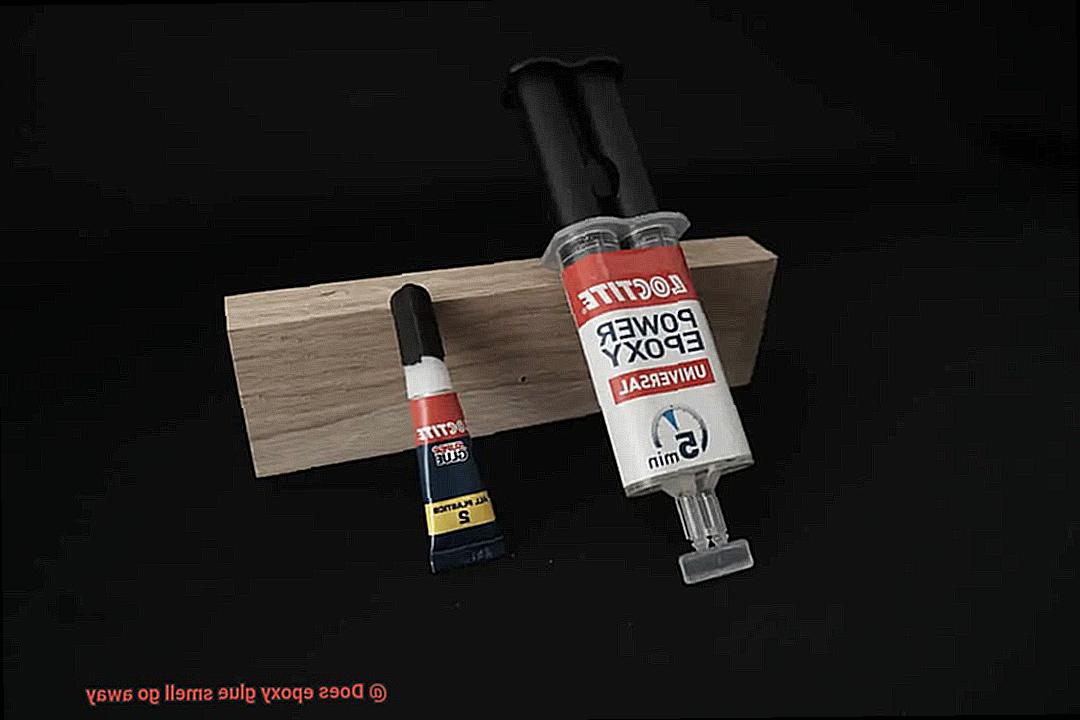
Specifically, the hardeners and resins in the epoxy are responsible for its strong scent. The hardener contains polyamine or amine compounds that initiate the chemical reaction necessary for the epoxy to harden and bond surfaces together. Meanwhile, the resin provides the adhesive properties of the epoxy and typically contains bisphenol A (BPA), which can also contribute to the smell. When these two chemical components are combined, they create a potent odor that can linger even after the epoxy has cured.
But not all epoxy glues have the same level of odor. Some brands may have lower levels of hardeners or resins, resulting in a milder scent. Additionally, age and storage conditions can also impact the strength of the odor. Epoxy that is old or improperly stored may have a stronger smell due to chemical breakdown or contamination.
So, what can you do to minimize the smell of epoxy glue? Proper ventilation is key when using this adhesive. It’s important to work in a well-ventilated area or use a fan to circulate air while working with epoxy. Additionally, wearing a mask or respirator can help prevent inhalation of any fumes. After applying epoxy, clean up any excess with a damp cloth or paper towel and dispose of it properly.
How Long Does the Smell Last?
However, the good news is that the smell will eventually dissipate over time. The duration of the smell will depend on several factors, including the type and amount of epoxy used, as well as the temperature and humidity levels in the environment.
Generally, most types of epoxy glue will have a strong odor for a few hours after application. In some cases, the smell may linger for several days or even weeks, especially if used in an area with poor ventilation or high humidity levels. However, there are ways to speed up the process of getting rid of the smell.
One option is to use a fan or open windows to increase air circulation in the room. Another effective method is to use odor-absorbing products like activated charcoal or baking soda. These products are capable of absorbing unpleasant odors and eliminating them from the air.
It is essential to note that while the smell of epoxy glue may be unpleasant, it is not necessarily harmful to your health. However, if you have respiratory issues like asthma or are sensitive to strong odors, it is best to avoid prolonged exposure to the fumes.
Minimizing the Odor During Application
When it comes to working with epoxy glue, the pungent odor it emits can be a major concern. The fumes can cause headaches and even respiratory problems for some individuals. However, there are several effective methods to minimize the odor during application.
First and foremost, ensure that you are working in a well-ventilated area. This means opening windows and doors to allow for proper air circulation. A fan can also be used to help dissipate the fumes. It’s imperative to wear a mask or respirator to avoid inhaling the fumes directly, especially if you’re working in a smaller space.
Consider using a low-odor or odorless epoxy glue. Although these types of glues may cost slightly more than traditional ones, they are formulated with fewer volatile organic compounds (VOCs), which are responsible for the strong odor. This option not only provides a safer work environment but also makes for a more pleasant experience.
Proper mixing is also crucial in minimizing the odor during application. It is recommended that you follow the manufacturer’s instructions carefully and use smaller amounts of epoxy glue at a time. Larger quantities can produce more fumes, making the smell even stronger.
In addition, keeping your work area clean and organized can help minimize the odor during application. Any spills or excess glue should be cleaned up immediately using a solvent such as acetone or rubbing alcohol.
Removing the Smell After Curing
If you’ve ever worked with epoxy glue, then you know the lingering scent that it can leave behind. That strong and unpleasant smell can be a nuisance, but fear not – there are several effective methods to eliminate it once and for all. As an expert on this topic, I’m here to provide you with some of the best ways to get rid of the smell after curing.
First and foremost, an odor neutralizer is a quick and easy solution that can effectively break down the chemical compounds responsible for the smell. By spraying the neutralizer directly onto the cured epoxy surface, you can eliminate the odor within minutes. Once you’ve let it sit for a few minutes, simply wipe off any excess with a clean cloth.
Another option is to harness the power of vinegar. Vinegar is a natural deodorizer known for its potent odor-fighting properties. By mixing equal parts water and vinegar in a spray bottle and applying it directly to the epoxy surface, you can neutralize the smell effectively. Let it sit for a few minutes before wiping it off with a clean cloth.
If neither of these methods works, activated charcoal can be your go-to solution. Activated charcoal has remarkable odor-absorbing abilities that make it ideal for removing the smell of cured epoxy glue. Simply place a small bag or container of activated charcoal near the cured epoxy surface and let it sit for a few days. The charcoal will absorb all those pesky odor molecules, leaving your space smelling fresh and clean.
Ventilating the Area
Don’t forget about the importance of ventilating the area and taking necessary safety precautions to protect your health.
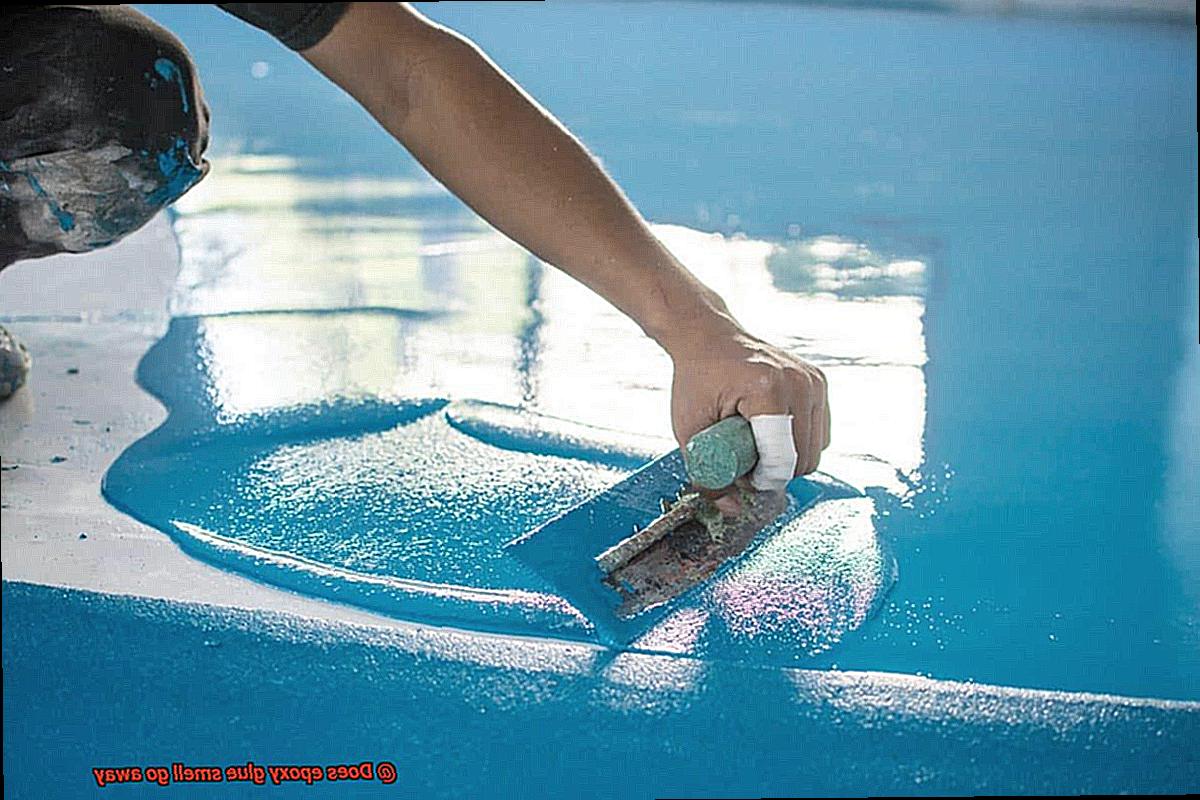
Epoxy glue emits a potent and unpleasant odor that can be harmful if inhaled. To minimize your exposure to these fumes, proper ventilation is key. Open windows and doors, use a fan to circulate the air, and if possible, work outside or in a well-ventilated area. This will help reduce the concentration of fumes in the air.
But ventilation alone is not enough. Protective gear is also crucial when working with epoxy glue. Wear gloves and a mask rated for organic vapors, ensuring it is properly fitted for maximum protection. This will not only shield you from harmful fumes but also prevent you from inhaling any dust or debris generated during the application process.
If you have respiratory issues or are sensitive to strong odors, it may be necessary to leave the area for a period of time until the smell dissipates. Always follow the manufacturer’s instructions and take necessary precautions when working with epoxy glue.
In summary, here are some important steps to take when using epoxy glue:
- Ventilate the area by opening windows and doors, using fans, and working in a well-ventilated area
- Wear protective gear such as gloves and a mask rated for organic vapors
- Leave the area if necessary to avoid exposure to harmful fumes
Absorbing Odors with Charcoal or Baking Soda
As an expert in absorbing odors with charcoal or baking soda, I’m here to share some tips and tricks that can help you neutralize that pesky smell.
Charcoal is a natural odor absorber that has been used for centuries. Activated charcoal is particularly effective as it has been specially treated to increase its surface area, making it more efficient at trapping impurities and toxins in its pores. To use charcoal to absorb the smell of epoxy glue, simply place small pieces or sachets of activated charcoal in the affected area and leave them for several hours or overnight. You’ll notice a significant reduction in the smell after this time.
Baking soda is another natural odor absorber that can be used to get rid of the smell of epoxy glue. Baking soda is known for its ability to neutralize acidic molecules and absorb moisture, which can help reduce the intensity of the odor. To use baking soda, sprinkle a generous amount over the affected area and leave it for several hours or overnight. Then, vacuum up the baking soda and dispose of it properly. This process may need to be repeated a few times to completely eliminate the smell.
It’s important to note that while both charcoal and baking soda can be effective at reducing the smell of epoxy glue, they may not completely eliminate it. If the smell persists, additional methods such as ventilation or using an air purifier may be needed.
When working with epoxy glue or any other materials that emit strong odors, it’s important to protect your health by ventilating the area and wearing protective gear like gloves and a mask rated for organic vapors. Think of it as putting on a suit of armor to shield yourself from harmful substances.
Cleaning with Soapy Water and White Vinegar
Look no further than the magic combination of soapy water and white vinegar to eliminate that pesky smell.
First and foremost, proper safety gear and ventilation are crucial when working with strong odors like epoxy glue. Once your project is complete, mix a solution of warm water and mild dish soap. Dip a clean cloth into the soapy water and wring out any excess liquid. Gently wipe down the surface where the glue has been applied to remove any excess adhesive and reduce the odor.
Now it’s time to bring out the secret weapon – white vinegar. Mix equal parts white vinegar and warm water in a separate container. Dip another clean cloth into the vinegar solution and wring out any excess liquid. Use the damp cloth to wipe down the surface again, paying special attention to any areas where the odor is still present.
White vinegar is a natural deodorizer that can effectively neutralize the strong smell of epoxy glue. However, be cautious when using vinegar on certain surfaces such as marble or granite, as it can cause damage.
After wiping down with vinegar, rinse the surface thoroughly with clean water and dry it with a clean towel. Repeat this process as necessary until the odor of epoxy glue has been completely eliminated.
Conclusion
In the world of adhesives, epoxy glue reigns supreme for its remarkable bonding properties. However, the pungent odor that often accompanies it can be quite overpowering and unpleasant. The good news is that with proper precautions, this smell will eventually dissipate over time.
Factors such as the type of epoxy used, the amount applied, and the environment where it was applied can all affect how long the smell lingers. But fear not. There are several effective methods to minimize or eliminate the odor during application and after curing.
Proper ventilation and wearing protective gear are essential when working with strong odors like epoxy glue. Using low-odor or odorless epoxy glue and ensuring proper mixing can also help reduce the smell during application. And once your project has cured, an odor neutralizer, vinegar solution, or activated charcoal can effectively break down those pesky chemical compounds responsible for the smell.
It’s crucial to prioritize safety when working with any strong-smelling materials. By following these tips and tricks, you can enjoy all the benefits of using this powerful adhesive without any unpleasant side effects.

